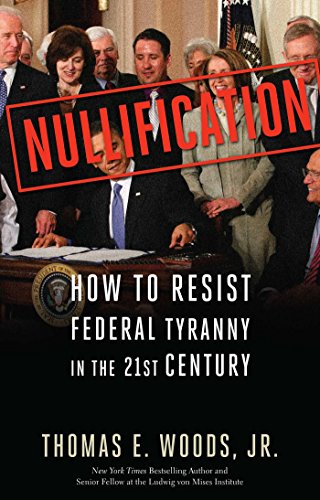Recently by Michael Tennant: Trial by Jury Duty
On September 14, 2001, President George W. Bush declared a national emergency with respect to the terrorist attacks of three days earlier. The National Emergencies Act of 1976 requires the President to renew this state of emergency on an annual basis if he wishes it to remain in effect. Bush renewed it every year he was in office, and now President Barack Obama has extended it for the second time during his term.
 American Conspiracies:...
Best Price: $1.39
Buy New $3.45
(as of 08:50 UTC - Details)
American Conspiracies:...
Best Price: $1.39
Buy New $3.45
(as of 08:50 UTC - Details)
The United States of America, therefore, is now entering its 10th year under a continual state of emergency — on the basis of a small number of (admittedly spectacular) terrorist attacks that took place in the space of a few hours back in 2001 and a handful of failed attempts since.
So-called national emergencies are a boon for governments, and particularly for heads of state. The “national emergency” in 1933 Germany occasioned by the firebombing of the Reichstag spurred the German parliament to grant Chancellor Adolf Hitler supposedly temporary dictatorial powers; we all know how that turned out. Egypt has been operating under a state of emergency since 1967 (except for a brief period in 1980 and ’81). Its government has taken advantage of its emergency declaration to lock up thousands of political prisoners indefinitely, to create a kangaroo court system for those it bothers to try, to prevent criticism of the regime, and to suspend other constitutional rights.
 Restoring the Lost Con...
Best Price: $14.60
Buy New $38.50
(as of 09:54 UTC - Details)
Restoring the Lost Con...
Best Price: $14.60
Buy New $38.50
(as of 09:54 UTC - Details)
Many of the Egyptian government’s abuses have occurred in the United States on a smaller scale, justified by such personages as Bush Justice Department official John Yoo on the basis of the ongoing national emergency. If our national emergency is allowed to stand for another 30-plus years, imagine how entrenched and expanded these policies would become.
 Nullification: How to ...
Best Price: $2.00
Buy New $8.34
(as of 05:25 UTC - Details)
Nullification: How to ...
Best Price: $2.00
Buy New $8.34
(as of 05:25 UTC - Details)
When the President declares a national emergency, wrote Harold C. Relyea, specialist in American national government with the Congressional Research Service, he “may seize property, organize and control the means of production, seize commodities, assign military forces abroad, institute martial law, seize and control all transportation and communication, regulate the operation of private enterprise, restrict travel, and, in a variety of ways, control the lives of United States citizens.”
Not all of these powers are exercised in every emergency. The 1976 law, intended to prevent abuses of the President’s power to declare national emergencies, requires the President to state the emergency statutes he wishes to invoke “either in the declaration of a national emergency, or by one or more contemporaneous or subsequent Executive orders.” Jason Ditz of Antiwar.com notes that “the current state of emergency empowers the president in a number of manners, including allowing him to suspend officer personnel laws related to the US military, suspending all legal limits on the number of commissioned officers, authorizations to grow the size of the military beyond the legal appropriations, waive limits on reserves, and the right to recall retirees to active duty.” This does not, however, prevent Obama or a future President from choosing to invoke more statutes under the same declaration of national emergency.





